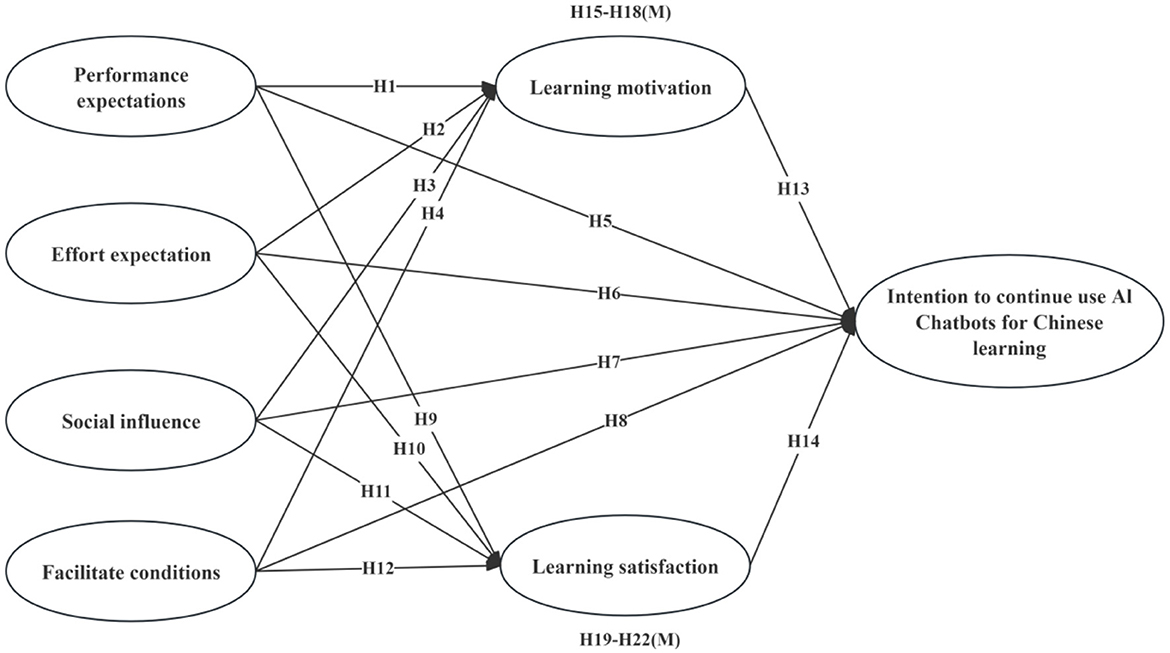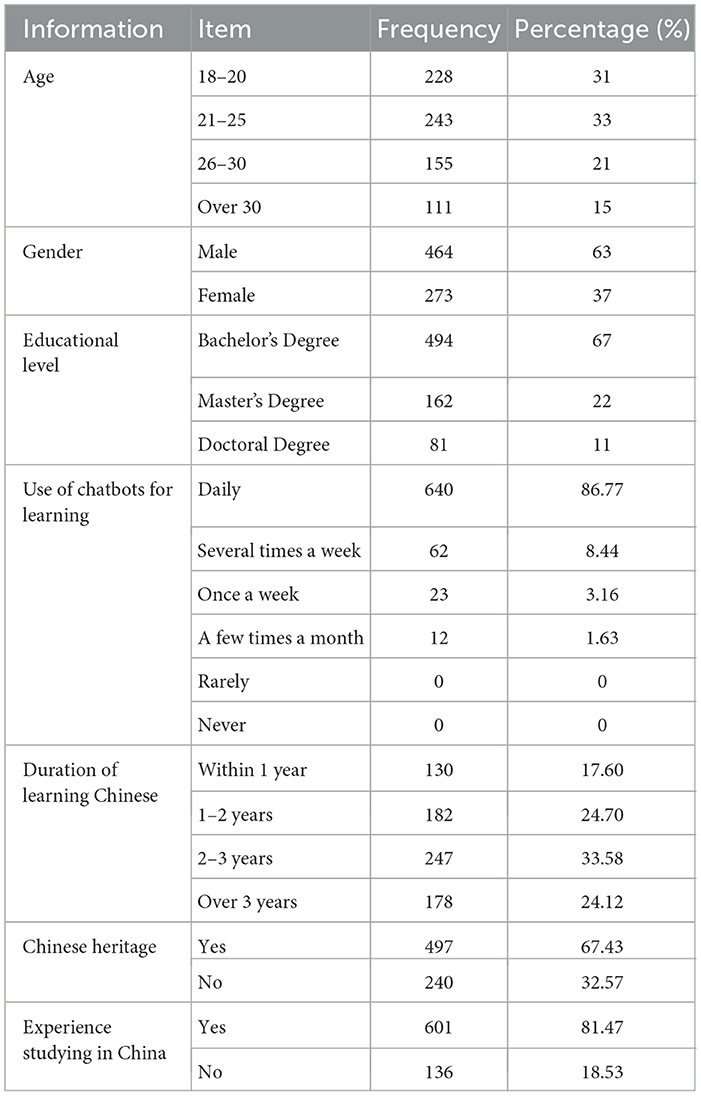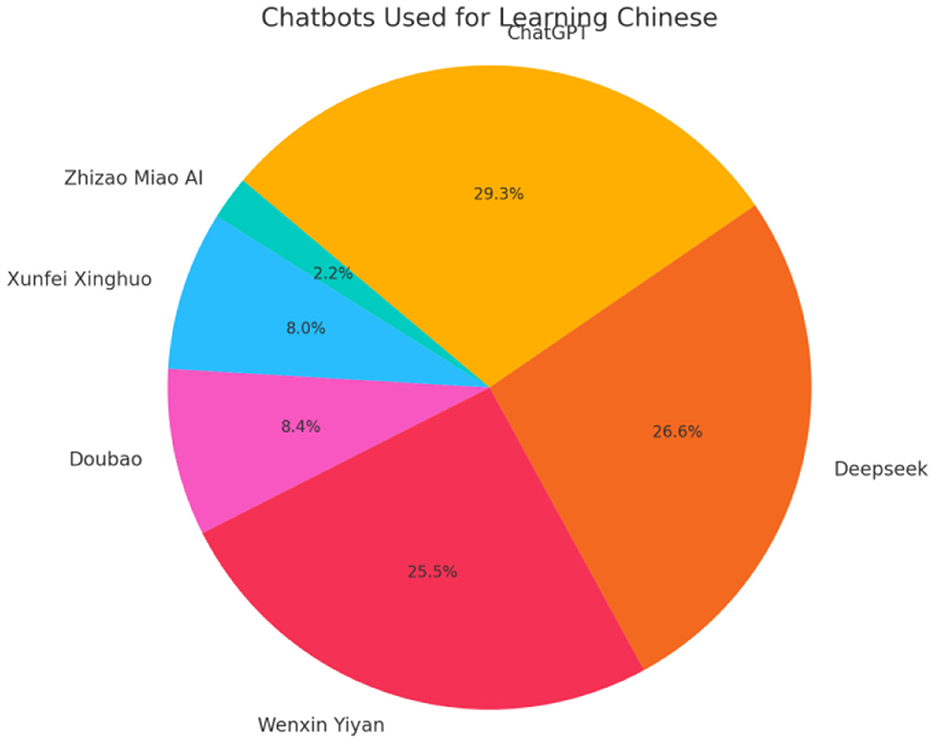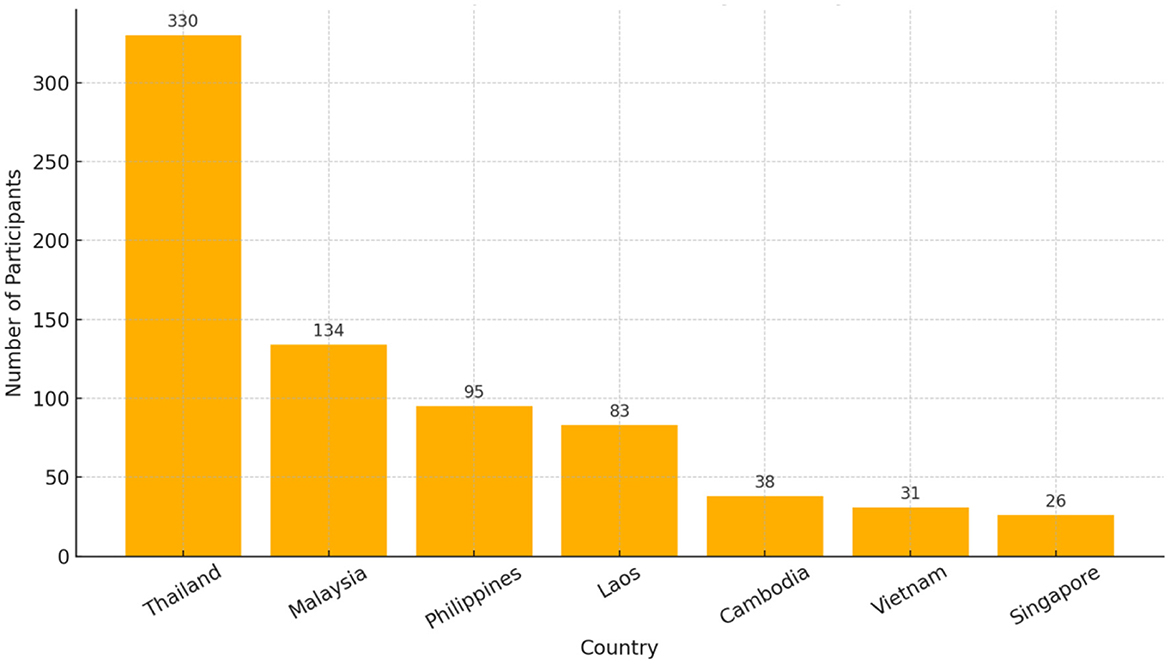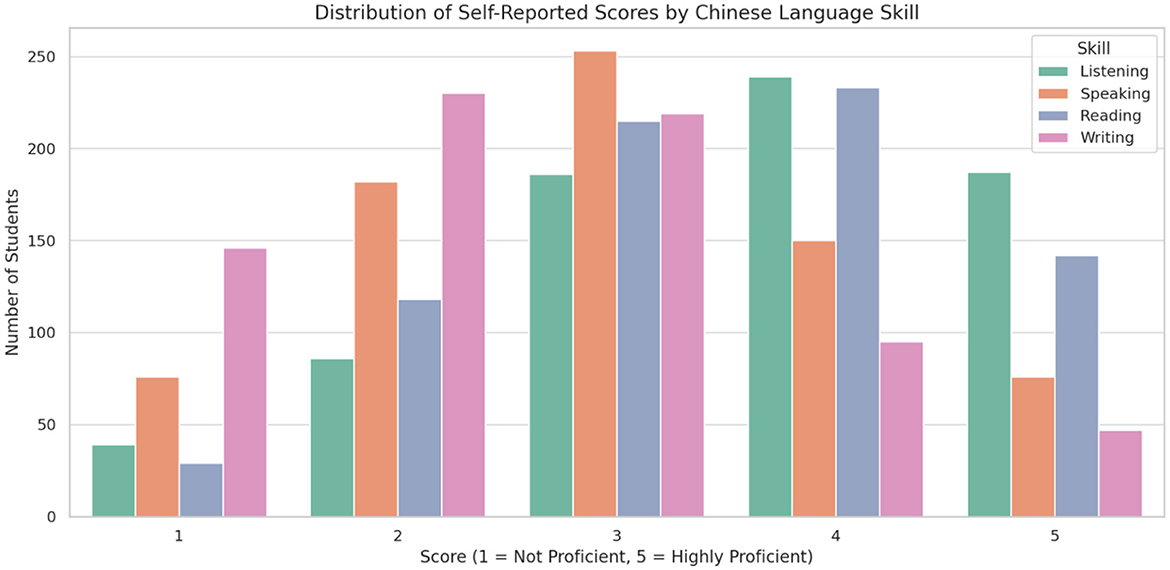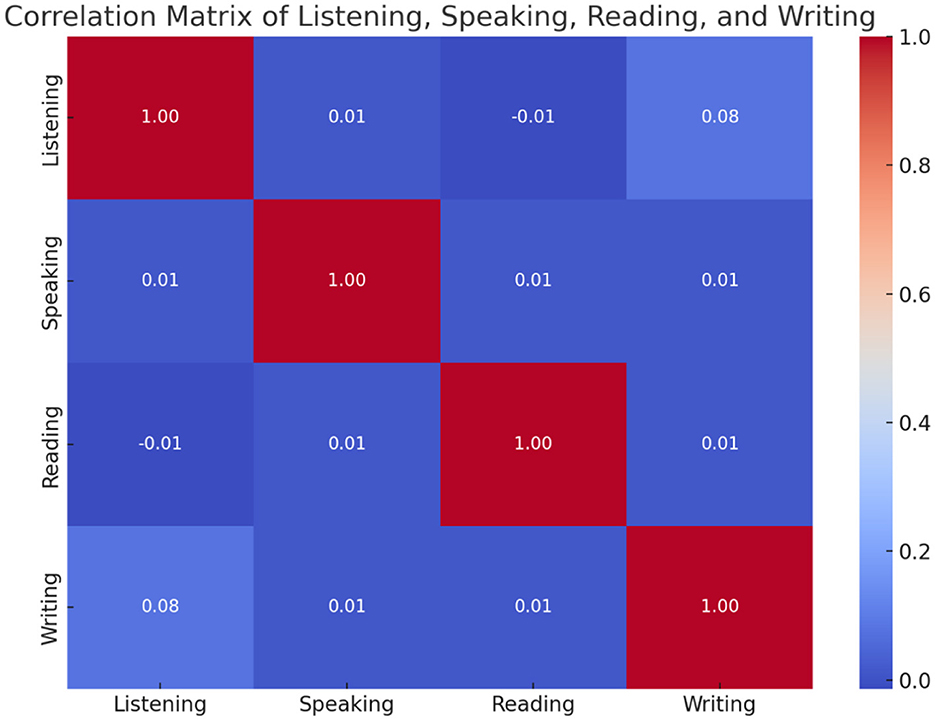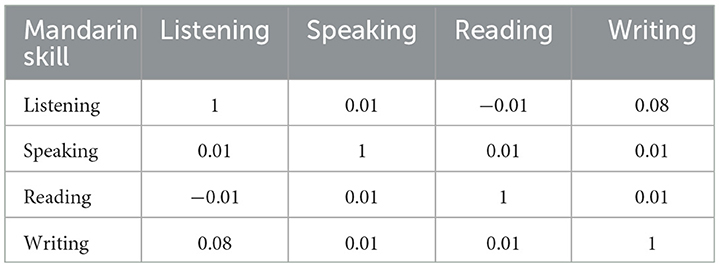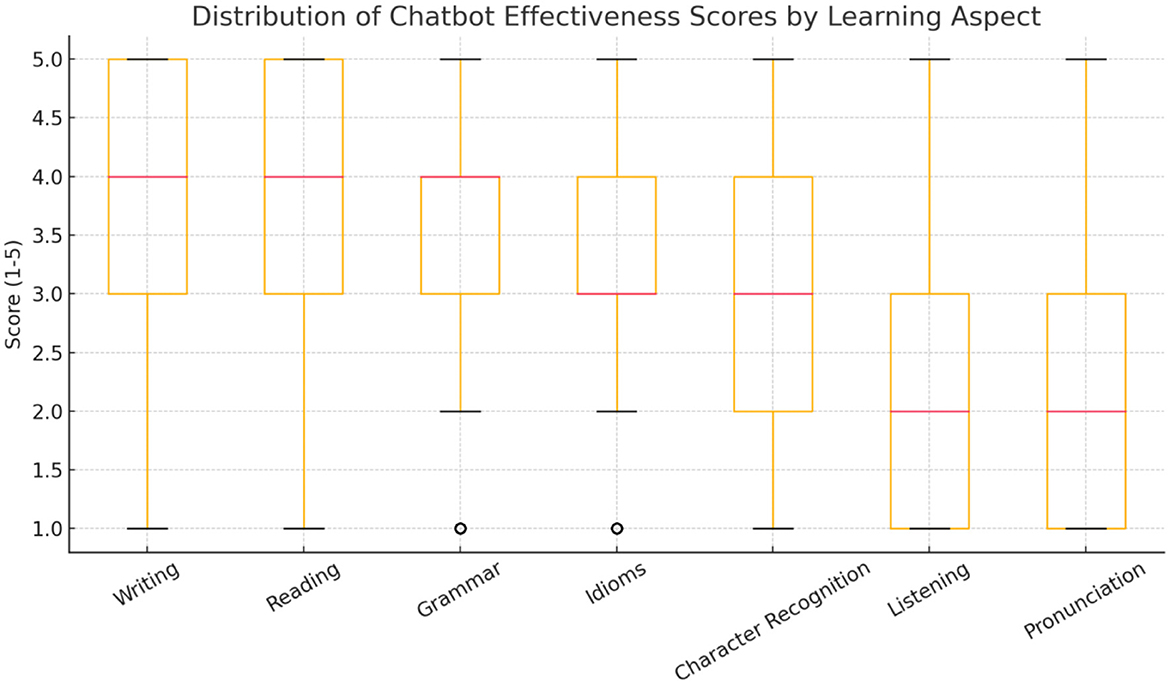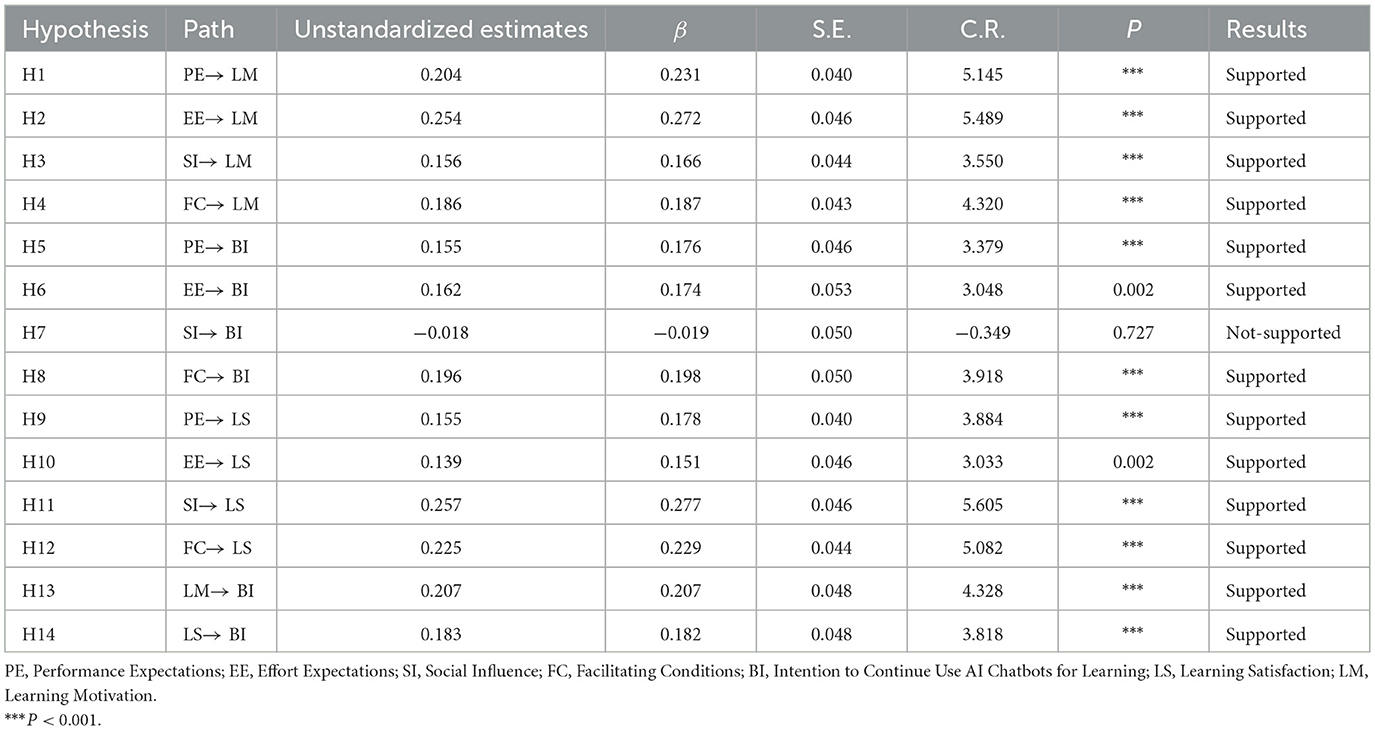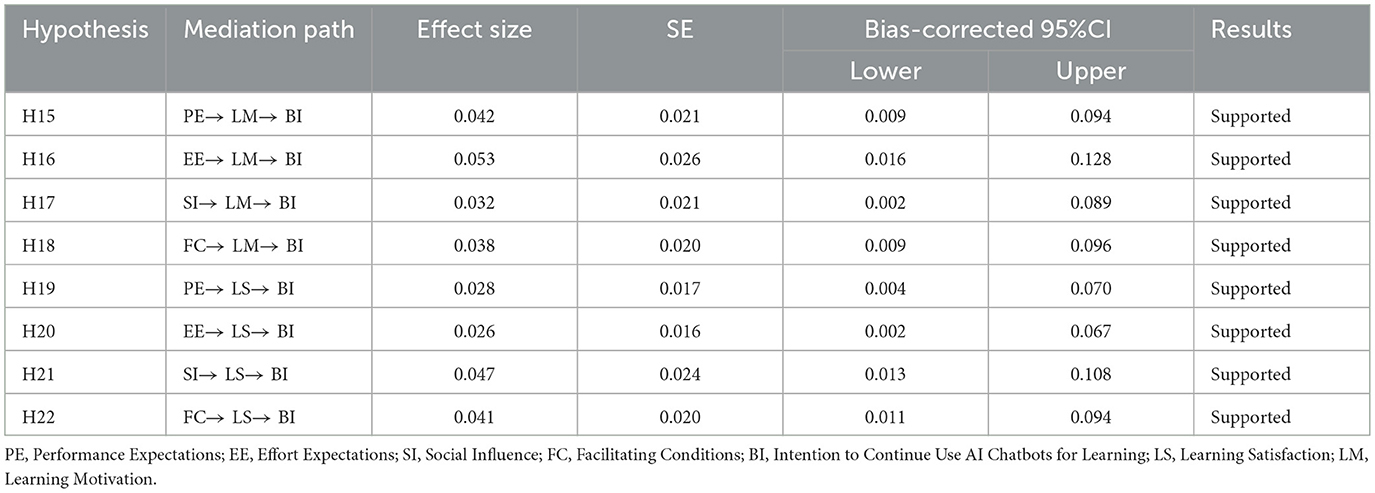- Department of Eastern Languages, Faculty of Humanities, Kasetsart University, Bangkok, Thailand
Introduction: Sustaining learners' continued use of AI chatbots for Mandarin instruction is a key challenge for EdTech developers, educators, and Confucius Institutes. Building on technology-continuance perspectives, this study examines how cognitive appraisals (performance expectancy, effort expectancy, facilitating conditions, social influence) shape learning motivation, learning satisfaction, and continuance intention among Chinese language learners.
Methods: A cross-sectional survey using convenience sampling was administered to learners at 16 Confucius Institutes across eight Southeast Asian countries (N = 737), all with prior experience using AI chatbots for Mandarin learning. A hypothesized model was tested via structural equation modeling (SEM) to assess direct effects on motivation, satisfaction, and continuance intention, as well as indirect (mediated) effects via motivation and satisfaction.
Results: Performance expectancy, effort expectancy, social influence, and facilitating conditions each had significant positive effects on learning motivation and learning satisfaction. For continuance intention, performance expectancy, effort expectancy, and facilitating conditions showed significant direct effects, whereas the direct effect of social influence was non-significant. Learning motivation and learning satisfaction acted as critical mediators, transmitting the effects of social influence and technological perceptions to continuance intention, thereby strengthening sustained engagement.
Discussion: Findings support a unified cognitive-affective model of technology continuance in AI-mediated language learning. To enhance sustained chatbot use, stakeholders should: (1) raise perceived usefulness through curriculum-aligned tasks and feedback, (2) reduce effort via intuitive design and scaffolding, (3) improve facilitating conditions (training, access, support), and (4) cultivate motivation and satisfaction through adaptive, engaging learning experiences. Although social influence alone does not directly drive continuance, it indirectly promotes sustained use by elevating motivation and satisfaction.
1 Introduction
As global economic integration continues to accelerate and China's influence in geopolitics and international trade continues to rise, the strategic significance of Chinese language acquisition (CLA) is increasing globally. CLA refers to Chinese as a second/foreign language (L2/CFL) rather than first-language acquisition. Over the past decade, the number of Chinese learners in Southeast Asia has continued to grow, with more than 25 million people learning Mandarin worldwide, a large portion of whom are concentrated in ASEAN countries (Koh et al., 2021). This language learning trend not only reflects the diversification of educational options, but also actively responds to regional labor market needs, diplomatic considerations, and countries' inclusion of Mandarin in their national language education systems (Likoko and Wu, 2025).
At the same time, the transformation of digital education in the post-epidemic era has completely changed the way language teaching is delivered, and has promoted the rapid rise of AI-enabled tools aimed at improving learner engagement, learning efficiency, and accessibility. Among these tools, AI-powered chatbots have gradually become teaching aids in Mandarin education with the help of natural language processing, adaptive feedback and machine learning. Chatbots and other AI tools are increasingly recognized as effective resources for interaction and adaptive feedback in language education (Woo and Choi, 2021; Zawacki-Richter et al., 2019). Systems such as ChatGPT are being pedagogically leveraged for formative feedback, academic writing support, and dialogic scaffolding rather than as mere novelties, reinforcing their instructional value (Nikolopoulou, 2024). Currently, products including Baidu (such as Ernie Bot), Deepseek, iFLYTEK, and other technology platforms are being widely introduced by Confucius Institutes across Southeast Asia to support asynchronous learning and alleviate teacher shortages. This shift is in line with the region's policy orientation to promote digitalization of education and narrow regional education gaps. Global policy and review reports emphasize that digital transformation has become a defining trend reshaping education systems worldwide, promoting personalized, scalable, and equitable learning opportunities (Huang et al., 2022; Zhu and Wang, 2025).
Confucius Institutes (CIs) are university-affiliated centers that deliver Chinese language and culture programs through host–partner collaborations. In Southeast Asia, CIs operate in Thailand, Indonesia, the Philippines, Malaysia, Singapore, Cambodia, Laos, and Vietnam—the eight national settings represented in our sample. While CIs may engage school partnerships, their core enrollments are older adolescents and adults (e.g., university students and continuing learners).
In terms of function, AI chatbots serve as interactive partners in Mandarin learning, offering personalized feedback, real-time conversation practice, pronunciation correction, grammar assistance, and vocabulary expansion. Leveraging natural language processing (NLP) and adaptive learning algorithms, these systems simulate teacher–student dialogues and support self-paced learning experiences (Vy and Pham, 2024; Yuan, 2025). Their core advantages include providing scalable language resources, enabling flexible learning beyond classroom constraints, and delivering differentiated instruction tailored to learner needs. Especially in the Southeast Asian context, these advantages are crucial to alleviating long-standing problems such as uneven distribution of qualified instructors and insufficient teaching staff. AI-powered chatbots are increasingly recognized as effective tools for interaction, adaptive feedback, and learner engagement in language education, reinforcing their potential role in personalized learning (Huang et al., 2022; Zhu and Wang, 2025).
However, despite the high initial adoption rate of AI chatbots, user retention is not optimistic. According to the 2023 ASEAN EdTech Survey, although 68% of Confucius Institute students said they had used AI chatbots, only 27% continued to use them within a quarter of use (Zhu et al., 2025). There are many factors behind this downward trend: lack of emotional interactivity, technical barriers (such as unstable network, inaccurate voice recognition), and insufficient cultural contextualization. In addition, existing chatbot systems fail to fully consider learner heterogeneity, including multidimensional differences in language proficiency, motivational structure, and cultural expectations, which further weakens user satisfaction and engagement (Hastomo et al., 2025; Wijaya et al., 2022).
These issues expose a theoretical and practical blind spot that deserves attention: although AI chatbots are expected to reshape the teaching landscape of Mandarin in resource-limited Southeast Asian regions, the understanding of their sustained use is still insufficient. In particular, research on the interactive relationship between psychological engagement (such as learning motivation and satisfaction) and behavioral intention is still scarce (Pozón-López et al., 2021; Rajeh et al., 2021). This problem is even more prominent for students at the Confucius Institute—despite their cultural and demographic diversity, they are often incorporated into a unified teaching model, and individual-level continuity determinants are ignored.
Against this background, this paper aims to construct a structural model to predict learners' motivation, satisfaction, and continuance intention in the process of Chinese language learning using AI Chatbots. The specific research objectives include:
1) To uncover the factors affecting the learning motivation and satisfaction in the context of using AI Chatbots for Chinese language learning.
2) To identify the key factors influencing the intention to continue use AI Chatbots for Chinese language learning.
3) To reveal the mediation role of learning motivation and learning satisfaction.
In addition, the second part will review the relevant literature and theoretical foundation and propose specific research hypotheses; the third part will introduce the research methodology, including the data collection and analysis process; the fourth part will present the empirical results of the structural model; finally, the fifth part will discuss the research results, put forward theoretical and practical implications, and point out the limitations of this study and future research directions.
2 Literature review
2.1 Theoretical approach
The Unified Theory of Acceptance and Use of Technology (UTAUT) attribute technology adoption behavior to four core variables: performance expectancy, effort expectancy, social influence, and facilitating conditions (Venkatesh et al., 2003). This theoretical model has been widely used in multiple technology environments, including enterprise systems, mobile applications, and various educational technologies (Ayaz and Yanartaş, 2020; Dwivedi et al., 2019; Wijaya et al., 2025).
To make up for the structural limitations of UTAUT's emphasis on the cognition of technological externalities, this paper further introduces Self-Determination Theory (SDT) to explain the internal psychological mechanism behind human motivation. According to SDT, whether an individual's motivation can be sustained depends on whether he or she meets three basic psychological needs during the learning process: autonomy, competence, and relatedness (Ryan and Deci, 2000). In the field of language learning, the application of SDT is particularly significant, which effectively reveals how internal motivation affects learner engagement, learning persistence, and academic outcomes (Alamer et al., 2025; Lan and Hew, 2020). When learners feel a sense of control, self-efficacy, and connection with others, they are more likely to continue to participate and self-regulate their learning behaviors.
In the language learning environment supported by AI chatbot, although emotional responsiveness and interpersonal interaction are relatively limited, SDT provides a powerful perspective to show that the system can also stimulate learners' motivation and emotional engagement through the setting of personalized feedback mechanisms and autonomous learning paths. Therefore, based on SDT, this study constructs a model that uses learning motivation and learning satisfaction as mediating mechanisms to explain the transformation process from technology cognition (such as perceived usefulness and ease of use) to behavioral intention. This integrative framework effectively captures the dual mechanisms of cognitive (technical dimension) and affective (learner dimension) in chatbot use, providing a more detailed analytical path for understanding technology continuation behavior.
Recent empirical work in Chinese educational contexts has examined how AI-driven chatbots facilitate Mandarin learning by providing interactive speaking practice, adaptive feedback, and self-paced drills in both Confucius Institutes and domestic universities. For example, Huang and Chueh (2022) reported that college students using a WeChat-based chatbot for oral practice perceived higher performance expectancy because of improved pronunciation and conversational fluency. Wu et al. (2022) found that teacher encouragement and institutional support—captured as social influence—significantly boosted learners' behavioral intention to continue using AI chatbots in blended Chinese courses. These findings echo the propositions of both UTAUT and SDT, showing that cognitive evaluations of usefulness and ease of use, as well as the satisfaction of autonomy and competence needs, jointly drive students' engagement with AI-mediated learning tools. Nevertheless, most existing studies have focused on initial adoption or short-term learning gains, leaving the mechanisms that sustain long-term use—especially the mediating roles of learning motivation and satisfaction—largely underexplored. By incorporating these contextual insights, the present study grounds the integrated UTAUT–SDT framework in real practices of AI-supported Chinese-language education and highlights the theoretical gap it aims to address (Chang et al., 2023).
Conceptualization of constructs. In line with UTAUT as applied in educational settings, performance expectancy is defined as learners' belief that using AI chatbots enhances Chinese-language learning outcomes and task efficiency within CI courses; effort expectancy denotes the perceived ease of learning and operating chatbot functions and the associated reduction of cognitive burden; social influence captures perceived expectations or encouragement from teachers, peers, and CI programs to adopt chatbots; and facilitating conditions refer to the availability of organizational and technical resources (e.g., connectivity, devices, platform access, training) that support use. Drawing on Self-Determination, learning motivation is conceptualized as the constellation of intrinsic and extrinsic motives grounded in the satisfaction of autonomy, competence, and relatedness in chatbot-mediated learning (Yin et al., 2024a). Following an expectation–confirmation view, learning satisfaction is treated as a post-adoption affective–cognitive appraisal that the chatbot experience meets or exceeds prior expectations, and continuance intention denotes the intention to persist in using chatbots in subsequent Chinese-learning activities.
In addition, performance expectancy and effort expectancy not only directly affect continuance intention, but also indirectly play a role through motivation and satisfaction. By modeling these path relationships, this paper responds to the theoretical gap in the current literature, that is, many technology acceptance models often ignore motivational dynamics, and technology-related variables are rarely analyzed in the context of learner psychology.
2.2 Hypotheses development
When learners believe that a technology tool can effectively improve their performance, they are more likely to be motivated to learn; similarly, if the system is easy to operate and has low cognitive burden, learners are more likely to maintain continuous use behavior (Curum and Khedo, 2021; Dai et al., 2023; Ellikkal and Rajamohan, 2025). In addition, social influence—the influence of peers, teachers, or educational institutions on learners in terms of opinions and encouragement—has also been shown to positively shape the path of learning motivation (Al-Said, 2023; Wu et al., 2022). Facilitating conditions, such as technological infrastructure, digital resources, and institutional support, can effectively enhance learners' autonomy and competence, thereby strengthening both intrinsic and extrinsic motivation (Kapo et al., 2024; Mekheimer, 2025). Based on the above theoretical logic, this paper proposes:
H1. Performance expectancy positively influences learners' learning motivation to use AI chatbots for Chinese language learning in Confucius Institutes.
H2. Effort expectancy positively influences learners' learning motivation to use AI chatbots for Chinese language learning in Confucius Institutes.
H3. Social influence positively influences learners' learning motivation to use AI chatbots for Chinese language learning in Confucius Institutes.
H4. Facilitating conditions positively influence learners' learning motivation to use AI chatbots for Chinese language learning in Confucius Institutes.
In the field of educational technology adoption research, continued usage has always been regarded as a key outcome variable, especially in the AI-enhanced learning environment, where the novelty effect of technology is often difficult to maintain in the long term (Rodrigues et al., 2022; Shin et al., 2019). Therefore, whether learners are willing to continue using a technology often depends on their perception of whether the system can improve academic performance. When students believe that a tool can effectively improve their language expression ability, comprehension level or communication skills, their continuance intention will usually increase accordingly (Ni and Cheung, 2023; Ünal and Güngör, 2021). In the language learning scenario, performance expectancy can significantly predict users' continued participation behavior, because technical support is seen as an effective way to improve fluency, comprehension, and communicative competence (Huang and Chueh, 2022; Lee and Xiong, 2023). Complementarily, students' adoption intentions toward ChatGPT are shaped jointly by perceived usefulness and ease of use as well as social–institutional context, with significant differences across countries—underscoring the potential moderating role of culture and setting (Chopra et al., 2025).
At the same time, effort expectancy, that is, users' perception of the ease of use of the system, has also been confirmed in multiple studies as an important factor affecting continued adoption behavior (Al-Adwan et al., 2022; Baig and Yadegaridehkordi, 2025), especially in mobile learning and intelligent tutoring systems: intuitive interfaces and simple operations often help reduce cognitive burden and enhance user stickiness (Ni and Cheung, 2023). In addition, social influence is also a key variable in shaping user intention, especially in collectivist cultures and highly structured educational environments. In such situations, positive evaluation and encouragement from teachers, peers or institutions can often effectively stimulate learners' commitment and behavioral intention (Songkram et al., 2023). On the other hand, facilitating conditions, including infrastructure support, technical accessibility, and administrative support, also constitute the external guarantee required for students to continue using the system (Sabas and Kiwango, 2021). These conditions not only improve the operability of the platform, but also enhance students' trust in the system and confidence in use. Therefore, this paper proposes:
H5. Performance expectancy positively influences learners' continuance intention to use AI chatbots for Chinese language learning in Confucius Institutes.
H6. Effort expectancy positively influences learners' continuance intention to use AI chatbots for Chinese language learning in Confucius Institutes.
H7. Social influence positively influences learners' continuance intention to use AI chatbots for Chinese language learning in Confucius Institutes.
H8. Facilitating conditions positively influence learners' continuance intention to use AI chatbots for Chinese language learning in Confucius Institutes.
Learning satisfaction, which refers to learners' overall emotional and cognitive evaluation of their educational experience, has been widely regarded as a key antecedent variable affecting continued engagement with educational technologies in recent years (Bakir-Yalçin and Usluel, 2024; Liu et al., 2023). Performance expectancy, effort expectancy, social influence, and facilitating conditions are generally considered to be the main factors affecting satisfaction (Abbad, 2021). Specifically, when learners believe that a technology tool can effectively promote their academic outcomes and skill growth, performance expectancy will significantly enhance their satisfaction with the learning experience. In a language learning environment supported by AI chatbots, if learners perceive their own improvements in pronunciation, vocabulary mastery, and real-time interaction, their self-efficacy and sense of achievement will increase, thereby improving overall satisfaction (Abdelhalim and Alsehibany, 2025; Ding et al., 2025).
Similarly, effort expectancy is also closely related to satisfaction. When faced with a system with a friendly interface and simple operation, users are usually more likely to experience the pleasure of learning and reduce the anxiety caused by technical operations (Baig and Yadegaridehkordi, 2025; Venkatesh, 2000). This intuitive and easy-to-use design can effectively lower the threshold of use and enhance users' positive feelings. In addition, social influence, mainly manifested as active support from teachers, peers or educational institutions, can also improve learners' satisfaction by creating a good social atmosphere and learning culture. This influence is more obvious in the collectivist cultural context such as Southeast Asia (Chen et al., 2023). Finally, facilitating conditions-including stable digital infrastructure, technical support, and rich learning resources-provide learners with continuous operational guarantees during actual use, which helps to reduce external interference factors and further enhance learning satisfaction. In summary, this research posits:
H9. Performance expectancy positively influences learners' satisfaction with AI chatbot-assisted Chinese learning.
H10. Effort expectancy positively influences learners' satisfaction with AI chatbot-assisted Chinese learning.
H11. Social influence positively influences learners' satisfaction with AI chatbot-assisted Chinese learning.
H12. Facilitating conditions positively influence learners' satisfaction with AI chatbot-assisted Chinese learning.
Learning motivation and learning satisfaction, are also gradually regarded as important direct determinants of technology continuation behavior, especially in educational scenarios (Rajeh et al., 2021). Among them, learning motivation can be understood as the intrinsic motivation that drives learners to participate and continue to invest in academic tasks. In technology-mediated learning environments, especially in scenarios that encourage autonomous and self-directed learning, this variable is particularly effective in predicting behavioral intention (Zhang, 2025). When students are motivated to learn a language due to intrinsic interest or extrinsic goals, they are more likely to use AI chatbots as an effective tool to achieve their learning goals and continue to use this technology (Chiu et al., 2024).
At the same time, learning satisfaction, which refers to learners' subjective evaluation of their learning experience in terms of quality, relevance and results, has also been confirmed as a key variable affecting technology continuance intention in multiple studies (Ashrafi et al., 2022; Rajeh et al., 2021; Taghizadeh et al., 2022). This conclusion is reflected in various platforms, including online learning systems, mobile learning applications, and intelligent teaching systems. It is particularly noteworthy that when learners believe that language learning assisted by AI chatbots has a certain degree of effectiveness, interactivity, and emotional satisfaction, they are more inclined to use such tools for long-term learning (Jeon, 2024; Wei et al., 2025). Accordingly, this study posits that
H13. Learning motivation positively influences learners' intention to continue using AI chatbots for Chinese language learning.
H14. Learning satisfaction positively influences learners' intention to continue using AI chatbots for Chinese language learning.
In AI-based tutoring systems, learning motivation played a significant mediating role in the impact path of performance expectancy and effort expectancy on continuance intention (Ni and Cheung, 2023). Similarly, in the context of AI-supported higher education, social influence, and facilitating conditions indirectly affected learners' behavioral intention by stimulating motivational engagement (Wu et al., 2024). Relying solely on users' cognitive evaluation of usefulness and usability is still insufficient to fully predict their long-term usage behavior. In contrast, users' internal motivational states play a key bridging role in connecting technology perception and continued use intention.
According to SDT, motivation arises when learners perceive competence, autonomy, and relatedness—conditions that can be fostered by technological affordances and social-institutional environments. In chatbot-assisted Chinese learning, performance expectancy enhances perceived competence, effort expectancy reduces cognitive barriers and supports autonomy, social influence contributes to relatedness, and facilitating conditions create an enabling learning environment. These experiences collectively stimulate learners' intrinsic and extrinsic motivation, which, in turn, drives continuance intention. In self-regulated, low-social-engagement learning environments, such as AI chatbots, motivation often becomes a key mediating mechanism that transforms external influences into sustained behavioral engagement (Heikkinen et al., 2025; Henry and Liu, 2024). Although some studies have explored these related variables separately, there is still limited systematic research on how learning motivation mediates the influence path of the UTAUT construct, especially in the context of cross-cultural, AI-supported language learning. To address this theoretical gap, the present study proposes:
H15. Learning motivation mediates the relationship between performance expectancy and learners' intention to continue using AI chatbots for Chinese language learning in Confucius Institutes.
H16. Learning motivation mediates the relationship between effort expectancy and learners' intention to continue using AI chatbots for Chinese language learning in Confucius Institutes.
H17. Learning motivation mediates the relationship between social influence and learners' intention to continue using AI chatbots for Chinese language learning in Confucius Institutes.
H18. Learning motivation mediates the relationship between facilitating conditions and learners' intention to continue using AI chatbots for Chinese language learning in Confucius Institutes.
Satisfaction is generated when the user's initial expectations, such as judgments on the usefulness or ease of use of the system, are confirmed by positive experiences during actual use (Cho and Jeon, 2023). Performance expectancy, effort expectancy, social influence, and facilitating conditions have been shown to shape learners' satisfaction by influencing their cognitive evaluation of learning outcomes and the quality of system interactions (Abbad, 2021; Pan et al., 2024). More importantly, satisfaction does not only exist as a result of positive evaluation of technology, but its role is increasingly reflected as a psychological mediating bridge that can transform users' cognitive perceptions into actual sustained technology usage behaviors. In the context of using ChatGPT in higher education institutions, satisfaction significantly mediated the impact path of perceived usefulness and ease of use on continuance intention (Alshammari and Babu, 2025). Similarly, perceived satisfaction played a key mediating role between perceived usefulness and continuance intention in asynchronous online English learning contexts (Wang et al., 2022). On the other hand, students' engagement on English learning platforms affects their continuance behavior through satisfaction, and this mechanism is also significant (Dai et al., 2024). From a broader online learning environment, (Rajeh et al. 2021) found that satisfaction played an important bridging role between learner characteristics and system interaction quality and continuance intention based on structural equation modeling. Taken together, this study proposes:
H19. Learning satisfaction mediates the relationship between performance expectancy and learners' intention to continue using AI chatbots for Chinese language learning.
H20. Learning satisfaction mediates the relationship between effort expectancy and learners' intention to continue using AI chatbots for Chinese language learning.
H21. Learning satisfaction mediates the relationship between social influence and learners' intention to continue using AI chatbots for Chinese language learning.
H22. Learning satisfaction mediates the relationship between facilitating conditions and learners' intention to continue using AI chatbots for Chinese language learning.
Although TAM laid the foundation for technology acceptance research, its simplified structure focusing only on perceived usefulness and ease of use limits its explanatory power for sustained usage behaviors. UTAUT2 extends UTAUT by adding consumer-oriented constructs such as hedonic motivation and price value, but these are less relevant in institutional educational contexts like Confucius Institutes where access is non-commercial. We therefore adopt the original UTAUT for its parsimony and empirical robustness in education technology research. To address motivational dynamics and post-adoption processes often neglected in UTAUT-based studies, we integrate SDT to explain psychological engagement (autonomy, competence, relatedness) and ECT to highlight the role of satisfaction as a confirmation-driven mediator. This integrated model captures both cognitive evaluations of technology and affective-motivational processes underlying sustained chatbot-assisted Mandarin learning.
Figure 1 integrates constructs from three complementary theoretical perspectives.
3 Methodology
3.1 Data collection
This study utilized an online questionnaire distributed primarily through social media platforms such as Facebook, Instagram, WeChat, and WhatsApp. Additionally, support was sought from Chinese language instructors working at Confucius Institutes to assist in the dissemination of the survey. Seven hundred thirty-seven participants were recruited using a convenience sampling method. These respondents were affiliated with Confucius Institutes located in Southeast Asian countries, including Thailand, Indonesia, the Philippines, Malaysia, Singapore, Cambodia, Laos, and Vietnam. All participants had prior experience using AI chatbots for learning Chinese. Eligibility focused on learners studying Chinese as L2/CFL at CIs; heritage background was recorded as a control variable and does not indicate native-speaker status.
3.2 Instrument
The survey tool used in this study is a structured questionnaire, which is divided into eight parts and contains a total of 73 items. The questionnaire uses a five-point Likert scale, ranging from “Strongly Disagree” (1) to “Strongly Agree” (5), to carefully measure learners' attitudes, cognitive evaluations, behavioral intentions, and other psychological variables.
The first part of the questionnaire is a 9-item basic information survey, covering gender, age, country of origin, native language, years of learning Chinese, educational background, previous experience with chatbots, frequency of use of AI tools, and self-assessed digital skills. These demographic variables are used as control variables to adjust the model influencing factors in subsequent statistical analysis.
The second to sixth parts are measured around four core theoretical constructs, and the relevant items are adapted and localized based on the mature scales proposed by Ryan and Deci (2000). Among them, Performance Expectancy (a total of 4 items) is used to assess whether learners believe that the use of AI chatbots can help improve their Chinese language performance, including the perception of ability in the dimensions of listening, speaking, reading, and writing. Effort Expectancy (3 items) captures learners' perceptions of the ease of use associated with AI chatbot systems. Social Influence (6 items) reflects the degree to which learners perceive that significant others—including teachers, peers, and institutions—encourage or expect them to use AI chatbots. Facilitating Conditions (5 items) assesses the degree to which learners believe that the necessary resources and support are available to use AI chatbots. Intention to continue use AI chatbots for Chinese learning (3 items) measures students' willingness to continue using AI chatbots in future Chinese learning activities.
The seventh section focused on Learning Satisfaction (13 items), drawn from the validated scale developed by Kor et al. (2022). This construct reflects learners' overall affective and cognitive evaluations of their chatbot-assisted learning experience. Items encompass emotional fulfillment, perceived usefulness, and system responsiveness. Satisfaction is defined here as the degree to which learners' expectations about chatbot learning are met or exceeded, both emotionally and functionally.
The eighth section measured Learning Motivation (30 items), using the multidimensional framework by Seo and Green (2008). This framework distinguishes between intrinsic and extrinsic motivation in the context of digital learning. These items were selected to reflect autonomy, competence, relatedness, and goal-orientation. The learning motivation constructs comprised 30 items adapted from established scales capturing multiple subdimensions (intrinsic motivation, extrinsic regulation, and integrative motivation).
3.3 Data analysis
Before the formal survey was administered, a pre-test was conducted with 30 participants to assess the reliability and validity of the instrument. Reliability analysis using Cronbach's alpha confirmed strong internal consistency across all constructs, with alpha coefficients exceeding 0.80 for all scales. For example, learning motivation and satisfaction yielded coefficients of 0.983 and 0.960, respectively. Exploratory factor analysis further confirmed the structural validity of the instrument, with a KMO value of 0.865 and Bartlett's Test of Sphericity achieving significance (χ2 = 7,252.820, df = 2016, p < 0.001). Seven factors were extracted, cumulatively explaining 71.266% of the variance, indicating robust dimensional structure.
Subsequent data analysis proceeded through several stages. Descriptive statistics were first computed to profile the sample and evaluate response distributions. Reliability and validity tests were then applied to assess measurement integrity. Confirmatory factor analysis (CFA) was used to verify the measurement model, followed by structural equation modeling (SEM) to test the hypothesized relationships between constructs.
4 Results
4.1 Descriptive analysis
4.1.1 Participants information
Table 1 presents the demographic and usage-related characteristics of the 737 valid respondents. In terms of age, the majority fall within the 18–25 range (64%), indicating a concentration of young adult learners. Gender distribution shows a higher proportion of male participants (63%) compared to females (37%). Given the male-dominant composition (63% vs. 37%), we explicitly account for potential confounding by including gender as a control variable in the SEM, with direct paths from gender to the key endogenous constructs (learning motivation, learning satisfaction, and continuance intention). Thus, all reported structural coefficients are conditional on gender, reducing bias from unequal composition. Results should therefore be interpreted as gender-adjusted estimates for this CI sample rather than unconditional averages. Regarding educational background, 67% hold a bachelor's degree, followed by 22% with a master's and 11% with a doctoral degree. Chatbot usage frequency is notably high, with 86.77% of participants reporting daily use, and no respondents indicating rare or no use, reflecting a strong engagement with chatbot-assisted learning. For Chinese learning duration, 33.58% have studied the language for 2–3 years, followed by 24.70% for 1–2 years and 24.12% for over 3 years. Additionally, 67.43% of learners reported having Chinese heritage, and 81.47% had experience studying in China. These findings suggest that the sample comprises experienced and actively engaged language learners, suitable for investigating factors influencing continued chatbot use.
4.1.2 Different chatbots used for learning Chinese
Figure 2 presents the distribution of different AI chatbots used by participants for learning Chinese. ChatGPT was the most frequently used chatbot, accounting for 29.3% of responses, followed by DeepSeek (26.6%) and Wenxin Yiyan (25.5%). Doubao and Xunfei Xinghuo were selected by 8.4% and 8.0% of respondents, respectively, while Zhizao Miao AI was the least used at 2.2%. We clarify operating languages: ChatGPT is broadly multilingual (commonly used in English and Chinese), DeepSeek supports Chinese and English, Wenxin Yiyan/ERNIE Bot, Doubao, Xunfei Xinghuo/Spark, and Zhizao Miao AI are Chinese-first with varying levels of English support. In our sample, respondents reported using these tools primarily in Chinese for practice tasks. These results indicate a strong preference for large-scale, general-purpose chatbots, while China-developed alternatives also show moderate adoption among learners. This distribution further contextualizes the technological landscape in which participants engage with AI-supported Chinese learning. Note: Language availability reflects the platforms at the time of data collection; capabilities may evolve.
4.1.3 Distribution in different countries
Figure 3 illustrates the geographical distribution of participants across eight Southeast Asian countries. Thailand contributed the largest proportion of respondents (n = 330), followed by Malaysia (n = 134), the Philippines (n = 95), and Laos (n = 83). The remaining countries—Cambodia, Vietnam, and Singapore—had smaller representation, with 38, 31, and 26 participants, respectively. This distribution reflects the varying scales and reach of Confucius Institutes in the region, with Thailand serving as a primary hub for Chinese language education. The diversity of participation supports the cross-national generalizability of the study's findings.
4.1.4 Confucius institute distribution statistics
To ensure representativeness across the region, the study surveyed a total of 737 participants from Confucius Institutes in eight Southeast Asian countries. In Thailand, the largest number of respondents were from Kasetsart University (n = 59) and Chiang Mai University (n = 57), with additional contributions from institutions such as Mae Fah Luang University and Chulalongkorn University. In Malaysia, the Confucius Institute at Universiti Malaya yielded the highest participation (n = 38), followed by the University of Sabah (n = 27). In the Philippines, the sample was led by Angeles University Foundation (n = 27) and the University of the Philippines (n = 23). Laos recorded particularly strong engagement, with the National University of Laos and Suphanuphon University contributing 45 and 38 responses, respectively. Cambodia, Singapore, and Vietnam had more modest levels of participation, with key contributions from Battambang University in Cambodia (n = 16), Nanyang Technological University in Singapore (n = 18), and several Confucius Institutes in Vietnam each providing under 20 responses. This distribution reflects broad institutional diversity and adequate geographical coverage, enhancing the generalizability of findings across Southeast Asia.
4.1.5 Descriptive and correlational analysis of Chinese language skills
Figure 4 and Table 2 jointly present the descriptive and distributional characteristics of students' self-reported proficiency in four Chinese language skills: listening, speaking, reading, and writing.
As illustrated in Figure 4, listening and reading skills show relatively higher proficiency levels compared to speaking and writing. The modal scores for listening and reading cluster around level 4, indicating that a substantial number of learners perceive themselves as proficient in these two receptive skills. This is consistent with Table 2, where listening has the highest mean score of 3.61 (SD = 1.14), followed by reading with a mean of 3.46 (SD = 1.09). In contrast, speaking (M = 2.96, SD = 1.13) and especially writing (M = 2.55, SD = 1.13) exhibit lower average scores, with larger proportions of students reporting lower proficiency (scores of 1–2), suggesting these are perceived as more challenging skills.
The distribution further shows a skew toward moderate proficiency (score = 3) across all skills, with listening and reading displaying a wider spread toward high proficiency (scores of 4 and 5), whereas writing is heavily skewed toward the lower end. These patterns suggest that students generally find receptive skills (listening and reading) easier to acquire, possibly due to greater exposure and passive engagement, while productive skills (speaking and writing), which require active linguistic construction, remain more difficult to master within the current learning environment.
Figure 5 and Table 3 together present the correlation matrix among the four self-reported Chinese language skills—listening, speaking, reading, and writing. The results reveal that the correlations among these language skills are generally very weak and close to zero, indicating minimal linear association between them in this sample.
Specifically, the correlation between listening and writing is the highest observed (r = 0.08), though still very small in magnitude, suggesting a slight positive relationship. The correlations between all other pairs of skills (e.g., listening–speaking, speaking–reading, reading–writing) hover around 0.01 or even −0.01 (e.g., listening–reading), implying almost no observable co-variation in learners' perceived proficiencies across these domains.
This finding suggests that proficiency in one skill does not strongly predict proficiency in another among Confucius Institute students surveyed. It may reflect segmented learning experiences or curriculum structures in which different language competencies are developed independently, rather than integratively. Alternatively, it could point to learners' varying self-perceptions and confidence levels across specific skills, highlighting the importance of adopting skill-specific pedagogical strategies in AI-assisted Chinese language instruction.
4.1.6 Learners' focus areas and perceived effectiveness of chatbots in Chinese language learning
Figure 6 presents the distribution of learners' preferred focus areas when using AI chatbots for Chinese language learning. The data reveal distinct patterns in learners' interests and highlight the functionalities most frequently targeted in chatbot-assisted instruction.
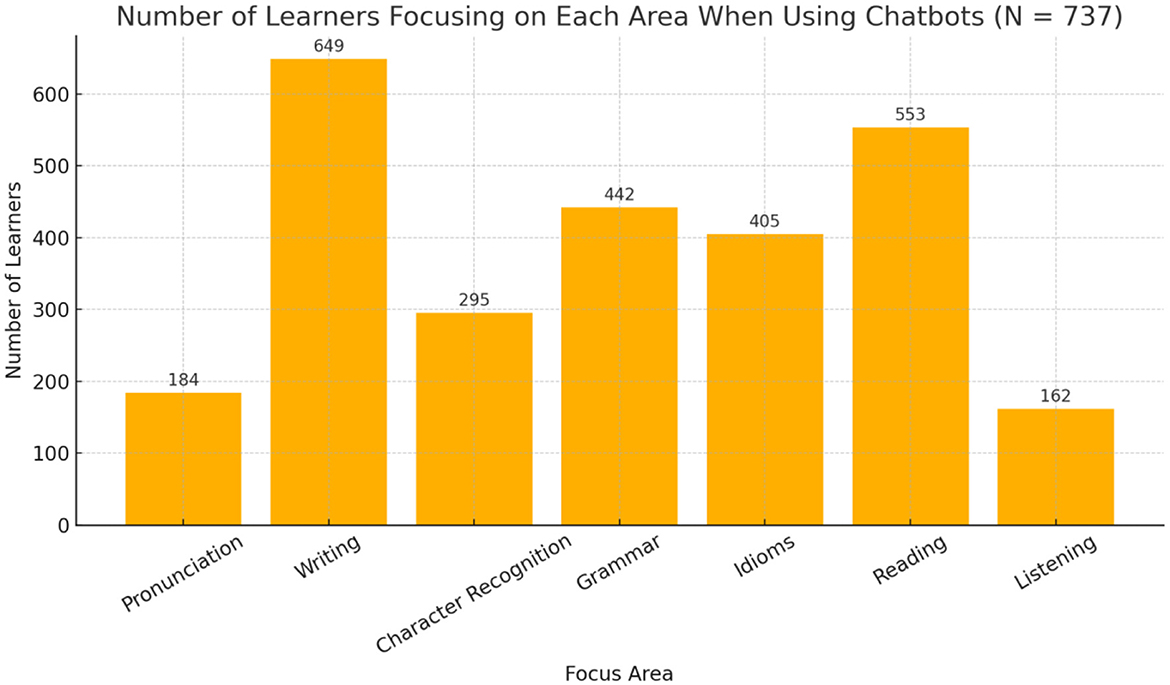
Figure 6. Preferences regarding areas of focus when using chatbots to learn Chinese (Percentage has been calculated as N = 737 and rounded to one decimal place: Writing 88.1%, Reading 75.0%, Grammar 60.0%, Idioms 55.0%, Character recognition 40.0%, Pronunciation 25.0%, Listening 22.0%).
Writing emerges as the most emphasized area, with 649 learners (approximately 88%) indicating it as a key focus. This suggests that learners heavily rely on chatbots to enhance their written Chinese, likely due to the availability of grammar correction, composition assistance, and sentence structuring features. Reading follows as the second most common focus, with 553 learners (75%), reflecting the chatbots' utility in supporting reading comprehension, vocabulary acquisition, and content interaction. Other areas such as grammar (442 learners) and idioms (405 learners) also attract significant attention, indicating learners' interest in improving structural understanding and cultural nuance in language use. Character recognition (295 learners) is moderately emphasized, likely due to the visual input features available in chatbot platforms.
By contrast, pronunciation (184 learners) and listening (162 learners) are the least prioritized areas. This may be due to limitations in chatbots' auditory feedback capabilities or a learner perception that chatbots are more suited for textual rather than oral practice. Overall, the data underscore that learners predominantly use AI chatbots for developing written and reading competencies, while auditory skills remain underemphasized, signaling a potential area for future enhancement in AI chatbot design for Chinese language education.
Figure 7 illustrates the distribution of chatbot effectiveness scores across seven distinct Chinese language learning aspects, based on a 5-point Likert scale (1 = Not Effective, 5 = Highly Effective). The boxplots reveal both the central tendencies and variability in learners' perceived effectiveness of AI chatbots for different language competencies.
Writing and reading exhibit the highest perceived effectiveness, suggests a strong consensus among learners regarding the chatbots' utility in supporting literacy-oriented tasks such as text generation, comprehension, and sentence construction. These areas also display minimal presence of low outliers, indicating consistently positive evaluations. Grammar, idioms, and character recognition receive moderately high ratings, with medians around 3–4. While generally perceived as effective, the wider interquartile ranges and occasional low outliers (notably in grammar and idioms) imply more variability in user experiences. This could reflect differences in chatbot design, user proficiency levels, or the complexity of conveying nuanced linguistic features through AI. In contrast, listening and pronunciation are rated lowest in effectiveness, both with medians at 2 and interquartile ranges concentrated between 1 and 3. This outcome reflects a widespread perception that current chatbot platforms are less equipped to facilitate oral-aural skills, likely due to limitations in speech recognition, feedback latency, and lack of natural spoken interaction.
Overall, Figure 7 highlights that while AI chatbots are viewed as highly effective for reading and writing, their utility for developing auditory skills remains limited, pointing to a potential direction for technical and pedagogical improvement in future chatbot applications for Chinese language learning.
4.1.7 Descriptive statistics of the scale item
Table 4 presents the descriptive statistics for each item within the study's seven core variables, offering foundational insights into respondents' perceptions of AI chatbots in Chinese language learning. Across all variables, the mean scores of individual items range from approximately 3.51 to 3.66, indicating that learners generally express moderate to moderately high levels of agreement with statements related to the effectiveness, ease of use, social reinforcement, and motivational impact of chatbot-assisted learning. For instance, items such as PE1 (M = 3.61), EE1 (M = 3.58), and SI2 (M = 3.65) reflect relatively positive expectations regarding chatbot performance, usability, and social support.
The standard deviations (S.D.) fall mostly around 1.00, revealing moderate variability in learners' responses. This dispersion suggests that while overall perceptions are positive, individual experiences differ depending on context, user familiarity, or institutional support. The skewness values are consistently negative across all items, generally ranging from −0.60 to −0.90, indicating a left-skewed distribution. This suggests that more respondents provided ratings at the higher end of the Likert scale, reinforcing the conclusion that attitudes toward chatbots are favorably inclined. Correspondingly, kurtosis values remain close to zero (with many between −0.2 and −0.5), indicating approximately normal distribution without extreme peaks or flatness.
The overall consistency in central tendency and dispersion, coupled with acceptable skewness and kurtosis, confirms the scale's appropriateness for further inferential analysis such as structural equation modeling.
4.2 Structural validity statistics
Table 5 presents the results of the Kaiser-Meyer-Olkin (KMO) Measure of Sampling Adequacy and Bartlett's Test of Sphericity. The KMO value is 0.977, which falls within the “marvelous” category according to Kaiser (1974), where values above 0.90 indicate outstanding adequacy for factor analysis. Hence, there are statistically significant correlations among the variables and confirms that the data are appropriate for factor extraction. Together, these two statistics provide strong empirical evidence of the dataset's structural validity.
In addition to the Fornell–Larcker criterion, we examined the Heterotrait–Monotrait (HTMT) ratio of correlations as recommended by Henseler et al. (2015). All HTMT values among the constructs were below the conservative threshold of 0.85, indicating satisfactory discriminant validity ().
4.3 Confirmatory factor analysis
4.3.1 Measurement model and fit metrics
Table 6 presents the goodness-of-fit indices for the measurement model, confirming that the model demonstrates an excellent fit to the data for the CFA.
4.3.2 Convergent validity
Table 7 shows the results of the convergent validity test, which is used to evaluate the consistency between multiple observational indicators used to measure the same construct. Such evaluations are usually based on three core criteria: standardized factor loadings, composite reliability (CR), and average variance extracted (AVE). From the results, all standardized factor loadings are higher than or close to the recommended threshold of 0.70. The analysis results in Table 8 provide strong support for the convergent validity of the measurement model. Each latent construct shows a high degree of internal consistency, and its observed indicators share a large proportion of variance, which further verifies the structural validity and theoretical consistency of the scale used in this study.
4.3.3 Discriminant validity
Table 8 presents the results of the discriminant validity test, which assesses the degree to which each latent variable in the measurement model is distinct from the others. Discriminant validity is confirmed when a construct shares more variance with its own indicators than with other constructs. The Fornell-Larcker criterion is applied here, which requires that the square root of each construct's AVE (shown on the diagonal in bold) should be greater than the correlation coefficients between that construct and any other construct in the model (off-diagonal values). These findings indicate that all constructs in the model exhibit satisfactory discriminant validity, meaning they are conceptually and statistically distinct from one another. This supports the robustness of the measurement model and justifies further analysis using structural equation modeling (SEM) to explore the relationships among constructs.
4.4 Structural model analysis
Table 9 presents the structural model's fit indices, providing empirical evidence for the adequacy of the model's overall goodness-of-fit. The χ2/df = 1.632 (< 3), RMSEA = 0.029 (< 0.08), CFI and TLI yield values of 0.959 and 0.957, respectively, both exceeding the recommended threshold of 0.85, suggesting that the model explains the covariance structure significantly better than the null model. Additionally, NFI reaches 0.900, and GFI = 0.885 and the AGFI = 0.876 also surpass the acceptable boundary of 0.85. Collectively, these indices demonstrate that the structural model possesses excellent fit characteristics across both absolute and relative fit metrics.
Table 10 provides empirical support for most of the hypothesized relationships between the study's core constructs. The analysis confirms the statistical significance of 13 out of the 14 hypothesized direct paths, with standardized path coefficients (β) ranging from 0.151 to 0.277 and critical ratios (C.R.) all exceeding the conventional threshold of 1.96, indicating strong explanatory power and robust direct effects.
Specifically, learning motivation (LM) is significantly influenced by performance expectations (β = 0.231, p < 0.001), effort expectations (β = 0.272, p < 0.001), social influence (β = 0.166, p < 0.001), and facilitating conditions (β = 0.187, p < 0.001), supporting hypotheses H1 to H4. These findings underscore the pivotal role of both technological and social-structural drivers in fostering learner motivation to use AI chatbots for Chinese language learning.
For continuance intention (BI), the analysis shows that performance expectations (β = 0.176, p < 0.001), effort expectations (β = 0.174, p = 0.002), facilitating conditions (β = 0.198, p < 0.001), learning motivation (β = 0.207, p < 0.001), and learning satisfaction (β = 0.182, p < 0.001) exert significant positive effects, confirming hypotheses H5, H6, H8, H13, and H14. Notably, social influence does not significantly predict continuance intention (β = −0.019, p = 0.727), rendering hypothesis H7 unsupported. This suggests that while social factors may inspire initial motivation, they may not directly determine long-term behavioral intention in AI-assisted language learning contexts.
With regard to satisfaction (LS), performance expectations (β = 0.178, p < 0.001), effort expectations (β = 0.151, p = 0.002), social influence (β = 0.277, p < 0.001), and facilitating conditions (β = 0.229, p < 0.001) all show strong and significant effects, validating hypotheses H9 through H12. Among these, social influence demonstrates the highest path coefficient (β = 0.277), indicating its substantial role in shaping perceived satisfaction with AI chatbot-based learning experiences.
In summary, the path analysis reveals a well-supported structural model where technological expectations and contextual enablers significantly shape motivation, satisfaction, and continued usage, whereas the influence of social factors appears more limited in sustaining long-term behavioral intention.
To further assess the explanatory strength of the structural model, we report the coefficient of determination (R2) for the three key endogenous constructs. The results show that the model explains 62% of the variance in Learning Motivation (LM), 56% in Learning Satisfaction (LS), and 68% in Continuance Intention (BI). These gender-adjusted estimates indicate that the proposed predictors collectively account for a substantial proportion of variance in the core outcomes, thereby demonstrating strong explanatory power for the hypothesized mechanism of sustained chatbot use.
4.4.1 Path analysis for indirect effects
Table 11 presents the results of the mediation analysis using the bootstrap method to test the indirect effects of performance expectations (PE), effort expectations (EE), social influence (SI), and facilitating conditions (FC) on the intention to continue using AI chatbots for learning Chinese (BI), through the mediating roles of learning motivation (LM) and learning satisfaction (LS). All eight mediation path hypotheses (H15–H22) proposed in this study were supported, as their respective bias-corrected 95% confidence intervals (CIs) did not include zero and the effect sizes reached statistically significant levels.
In terms of motivational mediation, the indirect effects from PE [β = 0.042, CI = (0.009, 0.094)], EE [β = 0.053, CI = (0.016, 0.128)], SI [β = 0.032, CI = (0.002, 0.089)], and FC [β = 0.038, CI = (0.009, 0.096)] to BI via LM are all significant, confirming H15 through H18. The results show that learners' perception of system utility and ease of use, social encouragement, and infrastructural support levels can all positively affect their learning motivation, and this motivation further enhances their intention to continue using AI chatbots. Among them, the H16 (EE → LM → BI) path shows the strongest mediating effect, indicating that ease of use has a particularly significant indirect effect on continuance intention by stimulating learning motivation.
Similarly, satisfaction-based mediation paths are also confirmed. PE [β = 0.028, CI = (0.004, 0.070)], EE [β = 0.026, CI = (0.002, 0.067)], SI [β = 0.047, CI = (0.013, 0.108)], and FC [β = 0.041, CI = (0.011, 0.094)] significantly affect BI through LS, supporting H19 to H22. Among these, H21 (SI → LS → BI) demonstrates the strongest indirect effect, highlighting the central role of social influence in enhancing satisfaction, which subsequently drives sustained chatbot usage.
Collectively, these results underscore the dual mediating mechanisms through which technological and contextual factors influence learners' behavioral intention. Both learning motivation and learning satisfaction serve as significant psychological conduits, translating perceptions and experiences into long-term engagement with AI-supported language learning tools.
5 Discussion and conclusion
5.1 Theoretical implications
This study contributes to the theoretical discourse for predicts the intention to continue use AI chatbots for Chinese learning from technology and psychological perspectives, by constructing an integrative framework that synthesizes constructs from the UTAUT, SDT, and ECT. In contrast to earlier studies that applied UTAUT primarily to general technology adoption scenarios (Venkatesh et al., 2003), this research aligns with and extends recent efforts that apply UTAUT in the context of AI-supported educational technologies, especially within the field of language learning.
This study reveals that performance expectancy, effort expectancy, and social influence significantly stimulate learners' intrinsic and extrinsic motivation when mediated through psychological needs for autonomy and competence. These findings resonate with SDT literature but expand prior research by contextualizing motivation in AI chatbot–supported Chinese learning environments (Chiang, 2024; Ryan and Deci, 2020). This study further verified the mediating role of motivation between external technology perception and continuance intention. This finding has achieved theoretical extension based on the original UTAUT framework. By introducing motivational mechanisms, it has more comprehensively explained the path of continuous technology use.
Facilitating conditions and performance expectancy are key factors affecting learner satisfaction, especially when the AI chatbot system has good responsiveness, reliability and adaptability (Saihi et al., 2025; Xing and Jiang, 2024). Compared with the traditional understanding that satisfaction is simply regarded as the final result, this study repositions it as an active mediating variable. This repositioning has also been empirically supported by recent research on language learning technology. Instead, its influence needs to be achieved through learning motivation. This finding challenges the assumption of direct effects of normative pressure in the UTAUT model, indicating that social influence can only have a substantial impact on the learner's ongoing behavior after being internalized. This is highly consistent with the view of introjected regulation in SDT, that is, social norms need to be transformed into goals that individuals internally identify with before they can drive behavior (Ryan and Deci, 2000). This shift in perspective also differs from some previous studies. For example, Uludaǧ et al. (2025) reported that social influence can directly predict learners' intention to use AI tools, while this study pointed out that in environments with high autonomy and low social contact such as chatbots, the influence of normative cues is more likely to be reflected indirectly through motivational mechanisms, which strengthens the theoretical logic of SDT on the path of motivation internalization.
This reconfiguration of variable relationships shows that in the actual teaching environment, social pressure from peers, teachers or institutional culture can only truly affect their long-term learning behavior after being transformed into internal motivation by learners. Therefore, this study further enriches people's understanding of the role of emotional and volitional mechanisms in the adoption process of educational AI chatbots. Although the original UTAUT model emphasizes cognitive antecedents such as performance expectancy and effort expectancy, it pays insufficient attention to the emotional and motivational pathways on which users rely for continued engagement.
At the same time, this study further reveals how AI chatbots meet learners' psychological needs in the three dimensions of autonomy, competence, and relatedness by introducing Self-Determination Theory, thereby internalizing motivation and strengthening continuous behavioral intention. This theoretical perspective goes beyond the instrumentalist explanation of technology use and is more consistent with educational psychology's claim about the relationship between autonomous motivation and long-term learning behavior. For example, Shi and Zhang (2025) found that the introduction of AI tools in EFL teaching helps improve students' resilience and engagement by enhancing motivation and the use of metacognitive strategies.
This study divides learning motivation into two dimensions: intrinsic and extrinsic, covering motivational components such as language interest, learning pleasure, self-improvement, academic achievement, and career value (Chiang, 2024). The measurement tool was adapted from Seo and Green (2008) and has been verified in many digital learning studies. The measurement of learning satisfaction covers cognitive, emotional, and interactive dimensions, such as learning outcomes, interactivity with AI systems, timeliness of feedback, and overall platform experience. It is based on the scale constructed by Kor et al. (2022) and expanded in combination with recent studies by Yin et al. (2024b).
By embedding these key variables into a hybrid model. Unlike traditional technology adoption models that simply regard satisfaction and motivation as outcome variables, this paper emphasizes that they are dynamic influence mechanisms that interact between social, technical, and individual-level multivariate variables. At the same time, the study pointed out that although social influence does not directly predict continuance intention, it indirectly affects engagement through the mechanism of motivation internalization, providing empirical support for the path of introjected regulation in SDT. These findings not only expand the explanatory scope of existing models, but also provide a more psychologically based theoretical framework for understanding AI-supported digital learning behavior.
5.2 Practical implications
This study provides key insights for advancing AI-mediated language instruction, revealing the psychological and technical factors behind learners' sustained engagement in Chinese learning with the support of AI chatbots.
For education policymakers and regional administrative agencies, the results highlight the central role of facilitating conditions in maintaining learner engagement. Rather than just providing technical infrastructure, building a reliable institutional support system, such as stable network connectivity, platform operation and maintenance guarantees, and administrative response mechanisms, plays a decisive role in translating the potential of technology into sustained learning behavior (Pu et al., 2025). Based on this, this study recommends that AI chatbot tools should be incorporated into the overall digital education strategy of countries or regions, especially in regions with high linguistic diversity and uneven distribution of educational resources such as ASEAN. Specific policies may include infrastructure subsidies, institutionalization of teacher training related to AI teaching methods, and financial and institutional incentives to support platform localization to promote the continuity and sustainability of AI-supported language learning.
At the educational institution level, especially Confucius Institutes and their host universities, the results provide a feasible path for learner-centered technology deployment. Students' continued use behavior was not only influenced by system functional attributes (such as performance and ease of use), but also deeply driven by emotional variables such as motivation and satisfaction (Jiang et al., 2023). This suggests that universities and teaching institutions should change their thinking during the implementation stage: no longer just focusing on the “quantity” of tool deployment, but should pay attention to the “quality-oriented” integration strategy. This includes embedding chatbot tools into course design, developing culturally adaptive content modules, and ensuring pedagogical consistency between AI functions and teaching objectives to enhance learning experience and enhance sustained engagement.
For language educators, the research clearly shows that the emotional and motivational dimensions of learning are not marginal variables, but core components of the successful implementation of AI-enhanced instruction. In actual teaching, teachers should not stop at introducing chatbot tools themselves, but also actively guide and regulate learners' participation status, and build a positive learning motivation atmosphere by stimulating autonomy, competence, and relatedness. Specific operations may include: combining AI task-based learning tasks, designing autonomous learning paths based on chatbot personalized feedback mechanisms, and contextualizing the use of chatbots in classroom discussions, so that they can better serve language learning oriented to communicative goals. Therefore, teachers play a dual role in AI education contexts: they are both coordinators of human-AI interactions and creators of motivational atmospheres in digital learning environments.
Therefore, platform developers should move from “functional logic” to “emotional logic” and “user initiative logic.” For example, by designing adaptive dialogue systems, introducing affect-sensitive feedback modules, integrating language tasks into cultural contexts, and providing multilingual interface customization options, learners' cognitive and emotional engagement can be effectively enhanced. At the same time, the scalability of the platform cannot be ignored—interoperability with teaching management systems, continuous updates to adapt to local contexts, etc., will be key factors in ensuring that the system remains relevant in the transnational education ecosystem.
5.3 Conclusion
This study systematically responded to the three research objectives by integrating the theoretical framework and revealed several key findings with theoretical value and practical significance. The results show that performance expectancy, effort expectancy, and facilitating conditions have a direct impact on students' continuance intention, while social influence plays an indirect role through learning motivation. This differentiated pattern marks the gradual shift of the understanding of the mechanism of technology adoption from the previous model that relied on linear and cognitive prediction paths to an explanatory perspective that emphasizes affective and motivational mediation. It is particularly noteworthy that learning motivation and learning satisfaction were identified as core mediating variables in this study, which not only expands the understanding of chatbot continuous use behavior, but also provides a more complete theoretical explanation for the user continuity model in the digital education environment.
Despite its contributions, this study is limited by its reliance on self-reported, cross-sectional data, which may restrict causal inference, and by its exclusive focus on Confucius Institute learners, which may constrain generalizability.
Future research should broaden the sampling scope to include diverse Chinese language learners across different institutional types and learning modalities, such as online self-learners, heritage learners, and vocational training participants. In addition, although this study employed robust statistical modeling, it lacked heterogeneity analysis across proficiency levels or user characteristics. Future work should incorporate subgroup comparisons—for instance, analyzing continuance intention by HSK levels, usage experience, or digital proficiency—to capture more nuanced learner differences. Methodologically, mixed-method designs are recommended to trace evolving engagement dynamics and to better examine the interaction quality between learners and chatbot agents. Finally, while the current study integrated UTAUT, SDT, and ECT, future research should also consider theoretical extensions, including flow theory, digital communication frameworks, and digital literacy constructs. These perspectives can provide richer explanations for affective and behavioral variations in chatbot-assisted language learning, ultimately enhancing both the theoretical depth and practical scalability of AI-supported education.
Data availability statement
The raw data supporting the conclusions of this article will be made available by the authors, without undue reservation.
Ethics statement
The studies involving human participants were reviewed and approved by the Research Ethics Committee of Mahachulalongkornrajavidyalaya University. The studies were conducted in accordance with the local legislation and institutional requirements. Written informed consent for participation was not required from the participants or the participants' legal guardians/next of kin in accordance with the national legislation and the institutional requirements.
Author contributions
SJ: Writing – original draft, Formal analysis, Writing – review & editing, Methodology, Conceptualization. KN: Investigation, Resources, Project administration, Data curation, Writing – original draft, Validation. WA: Investigation, Writing – review & editing, Resources, Project administration, Methodology.
Funding
The author(s) declare that financial support was received for the research and/or publication of this article. This research was funded by Kasetsart University through the Graduate School Fellowship Program.
Conflict of interest
The authors declare that the research was conducted in the absence of any commercial or financial relationships that could be construed as a potential conflict of interest.
Generative AI statement
The author(s) declare that Gen AI was used in the creation of this manuscript. To assist in the refinement of academic language, improve clarity, and ensure coherence in the writing of the manuscript. All intellectual content, analysis, and interpretations were developed by the author(s).
Any alternative text (alt text) provided alongside figures in this article has been generated by Frontiers with the support of artificial intelligence and reasonable efforts have been made to ensure accuracy, including review by the authors wherever possible. If you identify any issues, please contact us.
Publisher's note
All claims expressed in this article are solely those of the authors and do not necessarily represent those of their affiliated organizations, or those of the publisher, the editors and the reviewers. Any product that may be evaluated in this article, or claim that may be made by its manufacturer, is not guaranteed or endorsed by the publisher.
References
Abbad, M. M. M. (2021). Using the UTAUT model to understand students' usage of e-learning systems in developing countries. Educ. Inf. Technol. 26, 7205–7224. doi: 10.1007/s10639-021-10573-5
Abdelhalim, S. M., and Alsehibany, R. A. (2025). Integrating AI-powered tools in EFL pronunciation instruction: effects on accuracy and L2 motivation. Comput. Assist. Lang. Learn. 1–25. doi: 10.1080/09588221.2025.2534015
Al-Adwan, A. S., Yaseen, H., Alsoud, A., Abousweilem, F., and Al-Rahmi, W. M. (2022). Novel extension of the UTAUT model to understand continued usage intention of learning management systems: the role of learning tradition. Educ. Inf. Technol. 27, 3567–3593. doi: 10.1007/s10639-021-10758-y
Alamer, A., Robat, E. S., Shirvan, M. E., and Ryan, R. (2025). Self-determination theory and language learning: a multilevel meta-analysis. Educ. Psychol. Rev. 37:59. doi: 10.1007/s10648-025-10038-y
Al-Said, K. (2023). Influence of teacher on student motivation: opportunities to increase motivational factors during mobile learning. Educ. Inf. Technol. 28, 13439–13457. doi: 10.1007/s10639-023-11720-w
Alshammari, S. H., and Babu, E. (2025). The mediating role of satisfaction in the relationship between perceived usefulness, perceived ease of use and students' behavioural intention to use ChatGPT. Sci. Rep. 15:7169. doi: 10.1038/s41598-025-91634-4
Ashrafi, A., Zareravasan, A., Rabiee Savoji, S., and Amani, M. (2022). Exploring factors influencing students' continuance intention to use the learning management system (LMS): a multi-perspective framework. Interactive Learn. Environ. 30, 1475–1497. doi: 10.1080/10494820.2020.1734028
Ayaz, A., and Yanartaş, M. (2020). An analysis on the unified theory of acceptance and use of technology theory (UTAUT): acceptance of electronic document management system (EDMS). Comput. Hum. Behav. Rep. 2:100032. doi: 10.1016/j.chbr.2020.100032
Baig, M. I., and Yadegaridehkordi, E. (2025). Factors influencing academic staff satisfaction and continuous usage of generative artificial intelligence (GenAI) in higher education. Int. J. Educ. Technol. High. Educ. 22:5. doi: 10.1186/s41239-025-00506-4
Bakir-Yalçin, E., and Usluel, Y. K. (2024). Investigating the antecedents of engagement in online learning: do achievement emotions matter? Educ. Inf. Technol. 29, 3759–3791. doi: 10.1007/s10639-023-11995-z
Chang, J.-H., Chiu, P.-S., and Lai, C.-F. (2023). Implementation and evaluation of cloud-based e-learning in agricultural course. Interactive Learn. Environ. 31, 908–923. doi: 10.1080/10494820.2020.1815217
Chen, C., Bian, F., and Zhu, Y. (2023). The relationship between social support and academic engagement among university students: the chain mediating effects of life satisfaction and academic motivation. BMC Public Health 23:2368. doi: 10.1186/s12889-023-17301-3
Chiang, J. (2024). A conceptual eighteen crucial factors development of self-determination theory in practice of online learning environment. Educ. Inf. Technol. 30, 10023–10038. doi: 10.1007/s10639-024-13227-4
Chiu, T. K. F., Moorhouse, B. L., Chai, C. S., and Ismailov, M. (2024). Teacher support and student motivation to learn with Artificial Intelligence (AI) based chatbot. Interactive Learn. Environ. 32, 3240–3256.
Cho, S.-A., and Jeon, Y. J. J. (2023). The decision-making process regarding the continuance intention of using branded apps: an integrated approach to the PAM and the TPB. Int. J. Contemp. Hosp. Manag. 35, 4158–4176. doi: 10.1108/IJCHM-03-2022-0331
Chopra, G., Bhaskar, P., Purohit, A., and Strzelecki, A. (2025). Unlocking ChatGPT's potential: a comparative study of student adoption intentions in higher education across India and Poland. Educ. Inf. Technol. 30, 18375–18396. doi: 10.1007/s10639-025-13536-2
Curum, B., and Khedo, K. K. (2021). Cognitive load management in mobile learning systems: principles and theories. J. Comput. Educ. 8, 109–136. doi: 10.1007/s40692-020-00173-6
Dai, J., Zhang, X., and Wang, C. (2024). A meta-analysis of learners' continuance intention toward online education platforms. Educ. Inf. Technol. 29, 21833–21868. doi: 10.1007/s10639-024-12654-7
Dai, Y., Liu, A., and Lim, C. P. (2023). Reconceptualizing ChatGPT and generative AI as a student-driven innovation in higher education. Procedia CIRP 119, 84–90. doi: 10.1016/j.procir.2023.05.002
Ding, D., Muhyiddin, B., and Yusof, A. (2025). Investigating the role of AI-powered conversation bots in enhancing L2 speaking skills and reducing speaking anxiety: a mixed methods study. Hum. Soc. Sci. Commun. 12:1223. doi: 10.1057/s41599-025-05550-z
Dwivedi, Y. K., Rana, N. P., Jeyaraj, A., Clement, M., and Williams, M. D. (2019). Re-examining the Unified Theory of Acceptance and Use of Technology (UTAUT): towards a revised theoretical model. Inf. Syst. Front. 21, 719–734. doi: 10.1007/s10796-017-9774-y
Ellikkal, A., and Rajamohan, S. (2025). AI-enabled personalized learning: empowering management students for improving engagement and academic performance. Vilakshan-XIMB J. Manag. 22, 28–44. doi: 10.1108/XJM-02-2024-0023
Hastomo, T., Sari, A. S., Widiati, U., Ivone, F. M., Zen, E. L., and Kholid, M. F. N. (2025). does student engagement with chatbots enhance english proficiency? ELOPE 22, 93–109. doi: 10.4312/elope.22.1.93-109
Heikkinen, S., Saqr, M., Malmberg, J., and Tedre, M. (2025). A longitudinal study of interplay between student engagement and self-regulation. Int. J. Educ. Technol. High. Educ. 22:21. doi: 10.1186/s41239-025-00523-3
Henry, A., and Liu, M. (2024). L2 motivation and self regulated learning: an integrated model. System 123:103301. doi: 10.1016/j.system.2024.103301
Henseler, J., Ringle, C. M., and Sarstedt, M. (2015). A new criterion for assessing discriminant validity in variance-based structural equation modeling. J. Acad. Market. Sci. 43, 115–135. doi: 10.1007/s11747-014-0403-8
Huang, D.-H., and Chueh, H.-E. (2022). Behavioral intention to continuously use learning apps: a comparative study from Taiwan universities. Technol. Forecast. Soc. Change 177:121531. doi: 10.1016/j.techfore.2022.121531
Huang, W., Hew, K. F., and Fryer, L. K. (2022). Chatbots for language learning—Are they really useful? A systematic review of chatbot-supported language learning. J. Comput. Assist. Learn. 38, 237–257. doi: 10.1111/jcal.12610
Jeon, J. (2024). Exploring AI chatbot affordances in the EFL classroom: young learners' experiences and perspectives. Comput. Assist. Lang. Learn. 37, 1–26. doi: 10.1080/09588221.2021.2021241
Jiang, S., Thaveewatanaseth, N., Numtong, K., and Ou, E. Y. (2023). Integrated model for adoption of blended teaching in teaching Chinese as a Foreign Language. Eurasian J. Educ. Res. 108, 351–374. doi: 10.14689/ejer.2023.108.020
Kaiser, H. F. (1974). An index of factorial simplicity. Psychometrika 39, 31–36. doi: 10.1007/BF02291575
Kapo, A., Milutinovic, L. D., Rakovic, L., and Maric, S. (2024). Enhancing e-learning effectiveness: analyzing extrinsic and intrinsic factors influencing students' use, learning, and performance in higher education. Educ. Inf. Technol. 29, 10249–10276. doi: 10.1007/s10639-023-12224-3
Koh, S. Y., Hoon, C.-Y., and Haji-Othman, N. A. (2021). “Mandarin Fever” and Chinese Language-learning in Brunei's middle schools: discrepant discourses, multifaceted realities and institutional barriers. Asian Stud. Rev. 45, 325–344. doi: 10.1080/10357823.2020.1801577
Kor, P. P. K., Liu, J. Y. W., and Kwan, R. Y. C. (2022). Exploring nursing students' learning experiences and attitudes toward older persons in a gerontological nursing course using self-regulated online enquiry-based learning during the COVID-19 pandemic: a mixed-methods study. Nurse Educ. Today 111:105301. doi: 10.1016/j.nedt.2022.105301
Lan, M., and Hew, K. F. (2020). Examining learning engagement in MOOCs: a self-determination theoretical perspective using mixed method. Int. J. Educ. Technol. High. Educ. 17:7. doi: 10.1186/s41239-020-0179-5
Lee, J.-C., and Xiong, L. (2023). Exploring learners' continuous usage decisions regarding mobile-assisted language learning applications: a social support theory perspective. Educ. Inf. Technol. 28, 16743–16769. doi: 10.1007/s10639-023-11884-5
Likoko, H. M., and Wu, P. M. (2025). A study on Tanzania foreign language education policies and its impact on the development of Chinese language in Tanzania higher education. Sustain. Futures 9:100599. doi: 10.1016/j.sftr.2025.100599
Liu, K., Yao, J., Tao, D., and Yang, T. (2023). Influence of individual-technology-task-environment fit on university student online learning performance: the mediating role of behavioral, emotional, and cognitive engagement. Educ. Inf. Technol. 28, 15949–15968. doi: 10.1007/s10639-023-11833-2
Mekheimer, M. (2025). Technological self-efficacy, motivation, and contextual factors in advanced EFL e-learning: a mixed-methods study of strategy use and satisfaction. Hum. Soc. Sci. Commun. 12:677. doi: 10.1057/s41599-025-04947-0
Ni, A., and Cheung, A. (2023). Understanding secondary students' continuance intention to adopt AI-powered intelligent tutoring system for English learning. Educ. Inf. Technol. 28, 3191–3216. doi: 10.1007/s10639-022-11305-z
Nikolopoulou, K. (2024). Generative artificial intelligence in higher education: exploring ways of harnessing pedagogical practices with the assistance of ChatGPT. Int. J. Changes Educ. 1, 103–111. doi: 10.47852/bonviewIJCE42022489
Pan, G., Mao, Y., Song, Z., and Nie, H. (2024). Research on the influencing factors of adult learners' intent to use online education platforms based on expectation confirmation theory. Sci. Rep. 14:12762. doi: 10.1038/s41598-024-63747-9
Pozón-López, I., Higueras-Castillo, E., Muñoz-Leiva, F., and Liébana-Cabanillas, F. J. (2021). Perceived user satisfaction and intention to use massive open online courses (MOOCs). J. Comput. High. Educ. 33, 85–120. doi: 10.1007/s12528-020-09257-9
Pu, R., Dong, R. K., and Jiang, S. (2025). Toward the education for sustainable development (ESD): digital leadership and knowledge-sharing behavior on the higher education institutional change. Educ. Inf. Technol. 30, 10567–10589. doi: 10.1007/s10639-024-13247-0
Rajeh, M. T., Abduljabbar, F. H., Alqahtani, S. M., Waly, F. J., Alnaami, I., Aljurayyan, A., et al. (2021). Students' satisfaction and continued intention toward e-learning: a theory-based study. Med. Educ. Online 26:1961348. doi: 10.1080/10872981.2021.1961348
Rodrigues, L., Pereira, F. D., Toda, A. M., Palomino, P. T., Pessoa, M., Carvalho, L. S. G., et al. (2022). Gamification suffers from the novelty effect but benefits from the familiarization effect: findings from a longitudinal study. Int. J. Educ. Technol. High. Educ. 19:13. doi: 10.1186/s41239-021-00314-6
Ryan, R. M., and Deci, E. L. (2000). Self-determination theory and the facilitation of intrinsic motivation, social development, and well-being. Am. Psychol. 55, 68–78. doi: 10.1037/0003-066X.55.1.68
Ryan, R. M., and Deci, E. L. (2020). Intrinsic and extrinsic motivation from a self-determination theory perspective: definitions, theory, practices, and future directions. Contemp. Educ. Pychol. 61:101860. doi: 10.1016/j.cedpsych.2020.101860
Sabas, J., and Kiwango, T. (2021). The assessment of facilitating conditions influencing the adoption of students' information system in higher learning institutions. Account. Bus. Rev. 13, 1–13. doi: 10.59645/abr.v13i1.2
Saihi, A., Ben-Daya, M., and Hariga, M. (2025). The moderating role of technology proficiency and academic discipline in AI-chatbot adoption within higher education: insights from a PLS-SEM analysis. Educ. Inf. Technol. 30, 5843–5881. doi: 10.1007/s10639-024-13023-0
Seo, W. J., and Green, B. C. (2008). Development of the motivation scale for sport online consumption. J. Sport Manag. 22, 82–109. doi: 10.1123/jsm.22.1.82
Shi, S., and Zhang, H. (2025). EFL students' motivation predicted by their self-efficacy and resilience in artificial intelligence (AI)-based context: From a self-determination theory perspective. Learn. Motiv. 91:102151. doi: 10.1016/j.lmot.2025.102151
Shin, G., Feng, Y., Jarrahi, M. H., and Gafinowitz, N. (2019). Beyond novelty effect: a mixed-methods exploration into the motivation for long-term activity tracker use. JAMIA Open 2, 62–72. doi: 10.1093/jamiaopen/ooy048
Songkram, N., Chootongchai, S., Osuwan, H., Chuppunnarat, Y., and Songkram, N. (2023). Students' adoption towards behavioral intention of digital learning platform. Educ. Inf. Technol. 28, 11655–11677. doi: 10.1007/s10639-023-11637-4
Taghizadeh, S. K., Rahman, S. A., Nikbin, D., Alam, M. M. D., Alexa, L., Ling Suan, C., et al. (2022). Factors influencing students' continuance usage intention with online learning during the pandemic: a cross-country analysis. Behav. Inf. Technol. 41, 1998–2017. doi: 10.1080/0144929X.2021.1912181
Uludaǧ, F., Kiliç, E., and Çelik, H. E. (2025). Artificial intelligence, social influence, and AI anxiety: analyzing the intentions of science doctoral students to use ChatGPT with PLS-SEM. Hum. Soc. Sci. Commun. 12:1308. doi: 10.1057/s41599-025-05641-x
Ünal, E., and Güngör, F. (2021). The continuance intention of users toward mobile assisted language learning: the case of DuoLingo. Asian J. Distance Educ. 16:1777. doi: 10.5281/zenodo.5811777
Venkatesh, V. (2000). Determinants of perceived ease of use: integrating control, intrinsic motivation, and emotion into the technology acceptance model. Inf. Syst. Res. 11, 342–365. doi: 10.1287/isre.11.4.342.11872
Venkatesh, V., Morris, M. G., Davis, G. B., and Davis, F. D. (2003). User acceptance of information technology: toward a unified view. MIS Q. 27, 425–478. doi: 10.2307/30036540
Vy, N., and Pham, V. P. H. (2024). AI chatbots for language practices. Int. J. AI Lang. Educ. 1, 56–67. doi: 10.54855/ijaile.24115
Wang, X., Lu, A., Lin, T., Liu, S., Song, T., Huang, X., et al. (2022). Perceived usefulness predicts second language learners' continuance intention toward language learning applications: a serial multiple mediation model of integrative motivation and flow. Educ. Inf. Technol. 27, 5033–5049. doi: 10.1007/s10639-021-10822-7
Wei, W., Zhao, A., and Ma, H. (2025). Understanding how AI Chatbots influence EFL learners' oral english learning motivation and outcomes: evidence from chinese learners. IEEE Access 13, 56699–56716. doi: 10.1109/ACCESS.2025.3554545
Wijaya, T. T., Cao, Y., Bernard, M., Rahmadi, I. F., Lavicza, Z., and Surjono, H. D. (2022). Factors influencing microgame adoption among secondary school mathematics teachers supported by structural equation modelling-based research [Original Research]. Front. Psychol. 13:952549. doi: 10.3389/fpsyg.2022.952549
Wijaya, T. T., Su, M., Cao, Y., Weinhandl, R., and Houghton, T. (2025). Examining Chinese preservice mathematics teachers' adoption of AI chatbots for learning: Unpacking perspectives through the UTAUT2 model. Educ. Inf. Technol. 30, 1387–1415. doi: 10.1007/s10639-024-12837-2
Woo, J. H., and Choi, H. (2021). Systematic review for AI-based language learning tools. arXiv [Preprint]. arXiv:2111.04455. doi: 10.9728/dcs.2021.22.11.1783
Wu, D., Zhang, S., Ma, Z., Yue, X.-G., and Dong, R. K. (2024). Unlocking potential: Key factors shaping undergraduate self-directed learning in AI-enhanced educational environments. Systems 12:332. doi: 10.3390/systems12090332
Wu, F., Jiang, Y., Liu, D., Konorova, E., and Yang, X. (2022). The role of perceived teacher and peer relationships in adolescent students' academic motivation and educational outcomes. Educ. Psychol. 42, 439–458. doi: 10.1080/01443410.2022.2042488
Xing, J., and Jiang, Q. (2024). Factors influencing user experience in AI chat systems–a satisfaction study based on factor analysis and linear regression. Kybernetes. doi: 10.1108/K-10-2023-2237. [Epub ahead of print].
Yin, J., Goh, T.-T., and Hu, Y. (2024a). Interactions with educational chatbots: the impact of induced emotions and students' learning motivation. Int. J. Educ. Technol. High. Educ. 21:47. doi: 10.1186/s41239-024-00480-3
Yin, J., Zhu, Y., Goh, T.-T., Wu, W., and Hu, Y. (2024b). Using educational chatbots with metacognitive feedback to improve science learning. Appl. Sci. 14, 9345. doi: 10.3390/app14209345
Yuan, H. (2025). Artificial intelligence in language learning: biometric feedback and adaptive reading for improved comprehension and reduced anxiety. Hum. Soc. Sci. Commun. 12:556. doi: 10.1057/s41599-025-04878-w
Zawacki-Richter, O., Marín, V. I., Bond, M., and Gouverneur, F. (2019). Systematic review of research on artificial intelligence applications in higher education – where are the educators? Int. J. Educ. Technol. High. Educ. 16:39. doi: 10.1186/s41239-019-0171-0
Zhang, Z. (2025). The role of robot-assisted learning in fostering learners' motivation, self-efficacy, and autonomy: self-determination theory framework. Learn. Motiv. 92:102184. doi: 10.1016/j.lmot.2025.102184
Zhu, M., and Wang, C. (2025). A systematic review of research on AI in language education: Current status and future implications. Lang. Learn. Technol. 29, 1–29. doi: 10.64152/10125/73606
Keywords: AI chatbots, Chinese language learning, continuance intention, Confucius Institute, learning motivation, UTAUT
Citation: Jiang S, Numtong K and Asavaratana W (2025) Toward sustained interaction: investigating the drivers of continued use of AI chatbots for language learning in Confucius Institutes. Front. Educ. 10:1656204. doi: 10.3389/feduc.2025.1656204
Received: 04 July 2025; Accepted: 17 October 2025;
Published: 06 November 2025.
Edited by:
Muhammad Khalilur Rahman, Universiti Malaysia Kelantan, MalaysiaReviewed by:
Kleopatra Nikolopoulou, National and Kapodistrian University of Athens, GreeceTommy Tanu Wijaya, Beijing Normal University, China
Duc Tran Cong, Ton Duc Thang University, Vietnam
Copyright © 2025 Jiang, Numtong and Asavaratana. This is an open-access article distributed under the terms of the Creative Commons Attribution License (CC BY). The use, distribution or reproduction in other forums is permitted, provided the original author(s) and the copyright owner(s) are credited and that the original publication in this journal is cited, in accordance with accepted academic practice. No use, distribution or reproduction is permitted which does not comply with these terms.
*Correspondence: Kanokporn Numtong, a2Fub2twb3JuLm5Aa3UudGg=
 Songyu Jiang
Songyu Jiang Kanokporn Numtong*
Kanokporn Numtong*